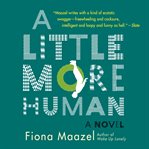Review by New York Times Review
ONE OF THE main characters in Fiona Maazel's third novel, "A Little More Human," is a mind reader who has a chip inserted in his brain enabling him to "retrieve otherwise irretrievable memories" and to "scrub" others' memories of him. Trying to remember the novel's numerous minor characters and follow its involuted plots, 1 coveted that chip. Maazel's first two novels - "Last Last Chance" and "Woke Up Lonely" - were casually plotted but insistently literary in their style, their buzzing verbal energy and left-field aperçus. In "A Little More Human," all the characters are plotting or plotted against, and are furthermore linked to an overarching corporate conspiracy. Lisa (whose husband, Phil Snyder, is the mind reader) secretly arranges her artificial insemination. Phil is being blackmailed by a woman named Effie he may have assaulted when drunk. Her sister, Ada, takes a job with Phil's cognitively impaired father (who suspects his wife was murdered) and scams money from Phil's best friend, Ben. These men, who are approaching 40, are nursing assistants at the Snyder Center for Enhancement Technology, or SCET, an idealistic but vaguely sinister medical institution founded on present-day Staten Island by Phil's neuroscientist parents. As 1 said, the plots get involuted. Maazel's omniscient narrator performs a more conventional kind of literary mind reading, revealing the thoughts of these characters and detailing their various motives. But the prevalence of plotting tends to reduce potentially complex figures to narrative devices. Dr. Phillip Snyder Sr. is a hoarder whose overstuffed house is a labyrinth of tunnels. This maze is clearly a metaphor for a brain that can no longer access its own memories, but it might serve equally as a stand-in for the novel itself, a set of pathways through which Maazel moves her experimental subjects. Dead ends abound, secrets surprise, good folks early are evil later and an unlikely hero emerges. Maazel's prose, meanwhile, is less style-conscious than it was in her previous books and more lab-manual functional - sometimes technical, usually straightforward and active, rarely figurative or buzzing. For these reasons, "A Little More Human" seems intended to be as much a high-concept entertainment as a literary novel. To be sure, Maazel is working in a sci-fi subgenre - call it brainiac fiction - with some distinguished precedents: Gibson's "Neuromancer," Vonnegut's "Galápagos," Percy's "Love in the Ruins," McElroy's "Plus," Powers's "Galatea 2.2" and, particularly, DeLillo's "White Noise" (in which the central characters perpetrate desperate plots to get the drug that will relieve their fear of death). Here, Ada needs thousands of dollars to buy her moribund mother "ARA-9," given to her after a cardiac operation at the Snyder Center. The drug, as Phil learns when he takes it, quickly makes one healthier and smarter, but it is highly addictive and exorbitantly expensive. Questions about who profits from the drug and who might withhold an antidote drive the conspiracy investigation in the novel's second half. Maazel includes some textbook neurology throughout, and has a minor character with left-brain-right-brain conflict, but the cognitive science is ultimately more a mainspring for the plots. "A Little More Human" works best on the meta level - readers might imagine their processing of the novel as its "real" subject. Our Occam's-razor brains are always searching for the simplest story line to explain disparate data. We want to understand all the information the book is hoarding, and we'd like to scrub dissonant information that interferes. Maazel suggests all of us (whether readers of her book or not) want our minds to be "more human" - more powerful, even "posthuman" - but this desire for advanced cognition can in fact make us less human, less understanding in our relations as we ignore or forget what doesn't fit our schemes and schemata. Maazel includes characters' actions that should remind self-aware readers there are liabilities to becoming "more human." Phil the nursing assistant turned amateur detective ignores his overwhelmed wife and sick child. Ada the scammer turned investigator forgets her secretive sister is more than a sex addict. Dr. Phillip Snyder wants his medical center to pursue "immortality" ; his wife had more limited and humane motivations. Read as a novel about reading, "A Little More Human" is more interesting than a merely entertaining addition to brainiac fiction. The novel's setting on present-day Staten Island feels deliberate: Even on this isle of middle-class "normalcy," Maazel seems to suggest, "Tempest"-like plots are hatched and mysteries surface. Washing up in a boat graveyard is a body that newspapers call "the Swimmer." (To identify him, characters travel to Denmark, which gives the novel's conspiracy a Pynchonian multinational quality.) The brain-damaged patients in the Snyder Center present the kind of cognitive idiosyncrasies reported by Oliver Sacks. Maazel refers twice to Nietzsche, whose "Human, All Too Human" celebrates free spirits against conventional mentality. This is, in other words, an unquestionably brainy book. I only wish it were as free-spirited and buoyant as the two that preceded it. In true meta fashion, readers might imagine their processing of this novel as its 'reeil' subject. TOM LECLAIR'S "Harpooning Donald Trump: A Novelist's Essays" was published in March.
Copyright (c) The New York Times Company [June 25, 2017]



